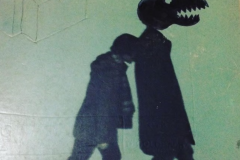I’m not attempting to be the pessimist, but to simply ask questions. Unfortunately, things sometimes come across that way through no fault of my own. Then again, those moments of cynicism are well placed around the stupidity of others coupled with their selfishness. Occasionally, I speak in riddles and it makes it difficult for people to understand what I’m really attempting to say here. This isn’t a political soapbox so I’ll just end things there because listening to Unsane and Big Black helps soothe the beast but Run The Jewels, that right there satisfies the mental.
It’s as if I’m walking in blind going into L.A. based pop artist BOYO, who literally is songwriter & multi-instrumentalist Robert Tilden. He just released his second album for this year, Alone Together In Los Angeles (Park The Van) and after listening to the opener “Tough Love,” I almost passed on it because of its clear vision of keyboard-driven pop. I wondered if I wanted to listen to this and I’m glad I kept listening because there’s so much ear candy filtering throughout it. “OCD” is a jangly little number that plays with guitar dissonance a bit but the melody is infectious. “Ghost Noise” is driven by jangly guitars and a steady rhythm and is just as captivating. Wait for the change and you’ll be hooked while “Memory Lane” gives orchestral pop a run for its money. Mind you, it’s not really “orchestral” but it does have the same feel.
One thing I didn’t expect this year was The self-titled released by TheDeadCanRap (Def Pressé), which is the collaboration between Paris-by-way-of-the-Bronx poet Mike Ladd and London-based street artist Remi Rough. Electronic beats ripple and subside as keyboard notes level things out on “Annual Report” as both rappers volley their words off one another. Ladd waxes poetic on “My Little Pony” feat. Malik Ameer, and as the others chime in, it’s clear TheDeadCanRap is derivative unto itself, rolling words around lofty yet low-key beats. The hum of the keyboard playing throughout shouldn’t be ignored either. There’s much more here, like “Imitations feat. Open Mike Eagle” as emcees rhyme over a 70s blaxsploitation-like backdrop and the title track featuring Nosaj from New Lyrics Kingdom. It hits hard with politically infused lyricism that’s indirectly striking. There’s a lot to take in here but well worth its weight in gold.
There are moments when listeners may be left scratching heads in wonderment but I’m not sure if this is one of those moments. This is Desolation Horse’s debut self-titled (American Standard Time Records) release and while the information received with it is pretty thorough, I’m not sure it gives me any closure as to who Desolation Horse really is. The band in-of-itself is a session drummer and multi-instrumentalist Cooper Trail. He’s toured with some relatively obscure acts last year like An American Forrest, Bart Budwig, and MAITA and while it still doesn’t lend much more of the artist himself, the album, well, it should probably stand on its own merit.
“Everyone Was Incredible” starts off pleasant enough with a few guitar notes plucked away, offset by a lower register that could be an additional guitar instead of a bass. The drumming is pretty steady as the song drifts along with the same melody, missing…hooks or significant changes throughout the track. Now it’s not necessarily a bad thing because Cooper milks the melody for all its worth and layers it with vocal harmonies and a sugary delivery. Once the title track opens, that uneasy feeling of sameness takes hold and I’m left wondering if he’s working the same formula throughout the majority of the album but fortunately, he doesn’t. The song is soft and alluring as it slowly crescendos with blissful guitar notes and strumming. Cooper’s voice is captivating, and I’m left wishing for more harmonies throughout it which he offers much of. Ok, I’m in. Completely.
If anything can be said about Cooper Trail and his Desolation Horse is that he’s a clever songwriting with lo-fi leanings in a hi-fi 2020. Even the American influence of “Heavy Rain,” fitted with banjo and quick-cocaine and lost love lyricism is a brightly lit number where a number of instruments are fitted in (keyboard, harmonica) but don’t overpower. It’s mixed in alongside 90s indie rock inspirations like “I Had In My Hand A Hand,” with his treated vocals sounding like Malkmus channeling Mark E. Smith on the driving number. While the album moves fluidly in different directions, it still unequivocally remains with the Desolation Horse identity intact. By the sounds of “Superchamp” though, Desolation Horse is well worth its weight in hooks & glory. Guitars sing alongside Cooper, providing the harmony itself. Easily a great track with piano lightly sprinkled.
When you find something unexpected like Desolation Horse, it’s comforting. Comforting in a way where one might think that yes, things are looking brighter, and hope isn’t lost for the future. We just keep swimming and remain thankful that Desolation Horse made its way out of the stable this year.
Facebook | Twitter | Instagram
Sometimes I don’t know where to begin, but with The Red Step and its self-titled debut (Pravda Records) that’s not much of a problem. Tobias Nathaniel has been intricate in providing me with a couple of my favorite bands, first as a co-conspirator with Three Mile Pilot and later with The Black Heart Procession. He’s also worked with Blonde Redhead, but all of this is trivial to what’s come next in The Red Step, a collaboration with notable Bosnian musicians keyboardist Boris Eftovski, bassist Rudolf Cibulski, and drummer Vladimir Markoski. The band is also joined by cellist and English born Sara Jane Seatherton. A cross-continent collaboration if you will, and we’re all the better for it.
The album runs the gamut of numbing aggression to captivatingly seething heartache. That’s a lot to take all in just one sitting. But it works. Make no mistake, with Nathaniel at the helm, his voice is immediately recognizable and while The Red Step may make moves that are similar, this isn’t a BHP placebo, this stands alone on its own merit.
At times the group keyboard work allows for movements that are over the top, and we feel the reverence in songs that take us to church (“For The Dead”) without need of tithing. The rhythm section follows the lead of guitars as Nathaniel’s darkly hued words captivate. The darkness around the music isn’t sad or depressing, instead it’s much more direct and fueled by rage but expressed with a controlled effort (“Nice Way To End”) or led by a deep Gothic-like bottom end (“Black Summer”), sans painted fingernails and thick eyeliner.
There are moments when The Red Step draws on its musical intensity led along by keyboards (“Reset”) but could easily transfer that same amount of energy into its guitars. The purpose here is to let the song drive itself and not to drive the song into oblivion, what is what the group does, offering up clarity through its composition. That same intensity is found through other driving numbers (“We Live On High”, “The Ghost Of Our Beginning”) where the band savagely attacks melodies, scattering the remains, placing them perfectly throughout. But it’s when the group draws on repetition that listeners are sure to be enthralled (“Temporary Loss”). Minor changes allow for interest, but I listen and want, no, need the band to continue playing the same melody. It’s repetitive without being repetitious, it’s somber without the melancholia, it’s tense without need of force. Simply put, it’s amazing.
Once the album reaches its finale (“Through Our Seasons”) I’m left clamoring for more. This is where Seatherton’s cello truly comes into play here, the beacon that leads the way with piano also being the other predominant instrument while the others fill out where necessary. Nathaniel’s voice is powerfully delicate here and every instrument on the song is fitted in perfectly. There’s nothing left to say about this release except that this is possibly the surprise of the year and I have hopes of hearing much more from The Red Step.
Facebook | Twitter | Instagram
The past couple of years has seen the resurgence of Kid Dakota, the musical project of Minnesota resident Darren Jackson. Through his music, even as recent as 2018’s Denervation, there’s been much pain and frustration and it’s understandable. With his new release, Age Of Roaches (Grave Face Records), life seems to have taken a turn in the best possible of ways.
First, I think I need to point out the obvious here which seems Kid Dakota has taken on a massive endeavor of this album, but by the looks of it, the challenge was accepted. The album opens with the title track, a grandiose offering, a pop-cultured phenom that rips through political and militarized imagery around a dying world. Jackson wraps his words around a restrained rhythm with a repeated guitar line that’s hypnotizing and catchy AF. The chorus itself changes the vocal dynamics before the song reverts back to its beginning. Somewhat. Distant yet powerful drums are briefly incorporated for a change of pace. Literally, it’s difficult to get past the track because of its infectiousness. Yes, you can play it over again and again without fear of it becoming tiresome. But you do have to move on for the rest of the album though.
The driving bounce of “Homesick” keeps you motivated, with guitars all around, accented by keyboard washes and sometimes punches like a journeyman. You don’t think it’s going to hit hard but that journeyman is a professional and knocks you on your ass with a right cross at the end. But I may have spoken too soon about the pain and frustration as the mood of “Prairie Flowers” changes drastically and dare I say, purposely. The melancholia is prevalent throughout here but the song remains beautifully captivating. Jackson moves back and forth from one mood to another, never comfortable standing in one spot, which works to his advantage. “A Fox In A Cage” is interesting lyrically, with Kid Dakota seemingly swimming against the current of what’s expected without fear of reprisals for thinking outside the box. All that over an interesting rhythm that’s unrelenting.
A bit of experimenting seems to go into the morose and somber “Cold War.” Kid Dakota lets the song play out through repetition with slight dynamic changes, keeping the song tightly wound. And then we get to “Futurecide,” a song that’s 21 years in the making, literally. Jackson first began writing this song back in ’96 and didn’t come up with anything else for it until 2017. Good thing he waited considering he’s like a caveman that discovers fire here as this song blisters with heat from beginning to end. It’s a pop gem that never lets up and while its carnival-like enthusiasm is obvious, it’s the delicacy of the song that doesn’t escape me. Instruments are carefully placed around it and everything serves an obvious purpose; from the opening keyboard notes to the reverbed guitar play. It all works intricately and it’s easy to find pop solace in and around the song’s notes.
Needless to say, I’m on board Kid Dakota’s wild ride through its challenging Age Of Roaches. With only 8 songs, it’s a dense recording with 40 minutes + of music that will leave everyone exhausted after every listen. You’ll want to stick around till the end of “Stephen Hawking,” which is a fiery ode to the scientist while also leaving you amazed at Kid Dakota’s talent.










Social Media